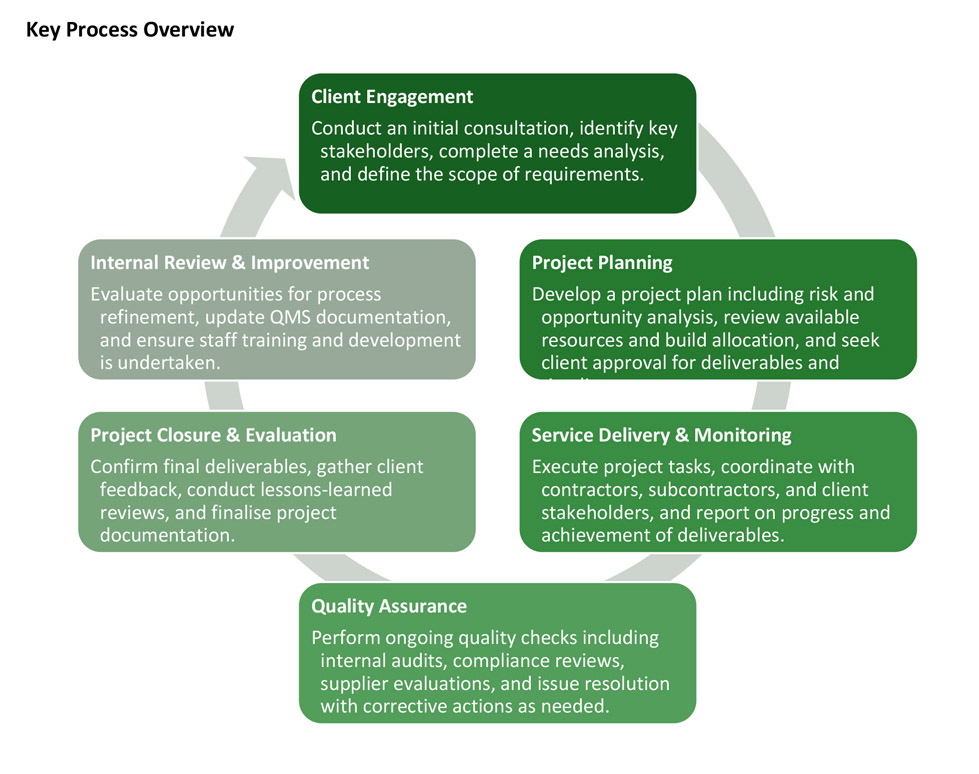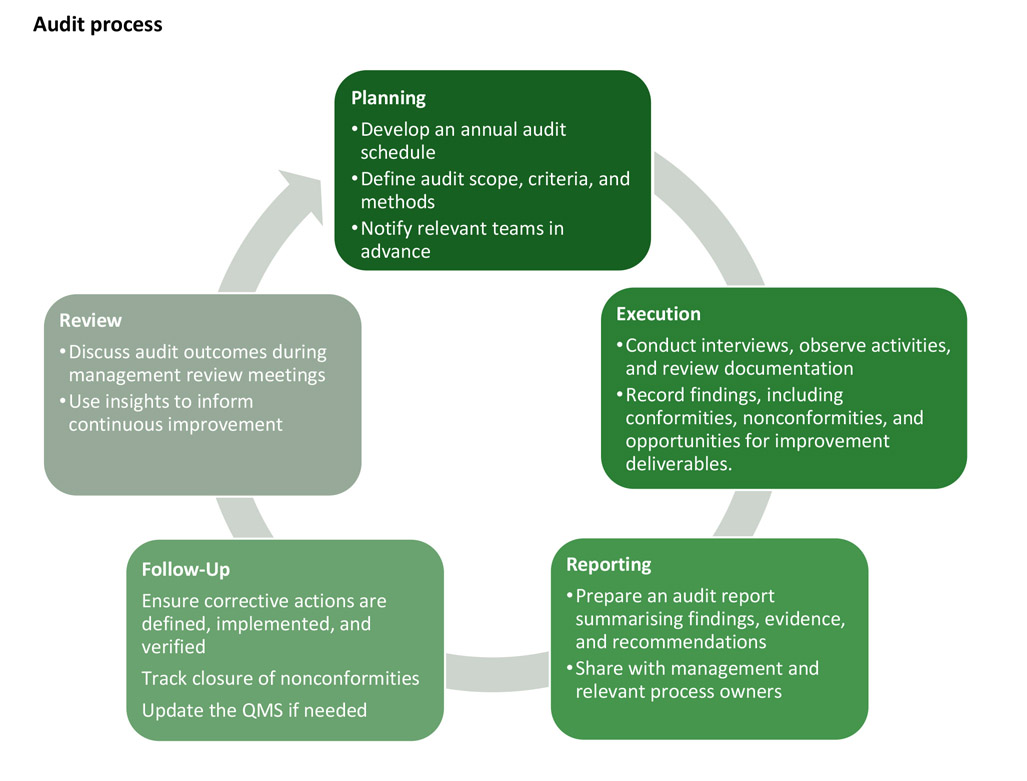Introduction
Project Management Solutions MK Ltd (PMS MK) operates as a specialist provider of embedded project management consultancy services, primarily serving the education and charity sectors. With a small, PRINCE2-certified team based in Milton Keynes, PMS MK integrates directly into client organisations to deliver tailored project outcomes aligned with strategic goals.
Internally, PMS MK is structured to support agile, collaborative delivery with a focus on transparency, continuous improvement, and client satisfaction. Externally, the organisation navigates a complex landscape of regulatory compliance, funding constraints, and stakeholder expectations typical of the sectors it serves.
The strategic direction of PMS MK is to be a long-term partner to its clients, delivering high-quality, compliant and cost-effective project solutions that enhance operational environments and deliver lasting value.
Quality is not just a standard – it’s a commitment. Our Quality Management System (QMS) is designed to give clients complete confidence in the way we deliver our services. Whether you’re a school, college, charity, or trust, we understand the importance of reliable, compliant, and cost-effective project outcomes. This policy outlines how we:
- Ensure consistent delivery through structured processes and clear accountability
- Monitor and improve performance through regular audits, client feedback, and lessons learned
- Manage risks proactively to protect your investment and reputation
- Maintain transparency and traceability in all documentation and communications
- Foster a culture of continuous improvement and professional development
Our approach is practical, collaborative, and tailored to your needs. We welcome feedback, act on it swiftly, and always aim to exceed expectations. With PMS MK, you can be assured that quality is built into every stage of your project.
PMS MK has identified the following interested parties whose needs and expectations influence the Quality Management System:
- Clients (schools, colleges, charities, trusts) expect timely, budget-conscious project delivery aligned with strategic and operational goals.
- Employees require a supportive work environment, professional development, and clear roles and responsibilities.
- Contractors and Subcontractors expect fair evaluation, clear communication, and collaborative working relationships.
- Regulatory Bodies require compliance with statutory and sector-specific regulations.
- Community Stakeholders expect projects that enhance environments, services, and long-term outcomes.
These needs and expectations are reviewed regularly and incorporated into planning, delivery, and evaluation processes.
This (QMS) applies to all consultancy services undertaken by PMS MK delivered to clients in the education and charity sectors. It covers both internal operations, client-facing services, supplier and subcontractor management, and compliance with applicable regulatory and contractual obligations. It is applicable to all employees, contractors, and third-party partners engaged by PMS MK. The QMS excludes any activities not directly related to project management consultancy or those outside the operational control of PMS MK.
We have the following systems and procedures in place to support us in our aim of total customer satisfaction and continuous improvement throughout our business:
- regular gathering and monitoring of customer feedback
- a customer complaints procedure
- selection and performance monitoring of suppliers against set criteria
- training and development for our employees
- regular audit of our internal processes
- measurable quality objectives which reflect our business aims
- management reviews of audit results, customer feedback and complaints
Our internal procedures are reviewed regularly and are held in a Quality Manual which is made available to all employees.

This policy is driven by the following management principles and behaviours:
- Build a mutually profitable relationship with our customers, ensuring their long-term success, through the understanding of their needs and the needs of their customers as well
- Achieve our commitments for quality, cost, and schedule
- Enhance the systematic research and use of best preventive practices at all levels and ensure reliable risk management
- Drive continual improvement and innovation based upon efficient business processes, well-defined measurements, best practices, and customer surveys
- Develop staff competencies, creativity, empowerment and accountability through appropriate development programs and show strong management involvement and commitment
Roles and responsibilities
This policy applies to all activities undertaken by PMS MK, including the work of employees, contractors, subcontractors, and third-party suppliers engaged on our behalf. We require all external partners to adhere to the same quality standards, policies, and procedures to ensure consistent, reliable, and compliant delivery of services to our clients.
In relation to internal audits, our Company Secretary will conduct audits and the Company Director will oversee the audit programme, ensuring impartiality and approves audit reports.
PMS MK strives to be the best provider of project management consultancy services to their clients. Using these guiding principles, everyone in the organisation is accountable for fully satisfying our customers by meeting or exceeding their needs and expectations with best-in-class solutions and services.
Our quality objectives are to:
- Achieve and maintain a minimum 95% positive rating in annual client satisfaction surveys
- Deliver at least 90% of projects within agreed programme tolerances
- Deliver at least 90% of projects within agreed budget tolerances
- Conduct lessons-learned reviews on all projects within 3 months of completion of service delivery
- Undertake bi-annual process reviews
- Ensure each employee undertakes a minimum of 2 days of professional development per year
- Ensure all key suppliers, and sub-contractors if applicable, are evaluated biennially against defined criteria
- Acknowledge 100% of complaints within 5 working days and close at least 95% of complaints within 30 working days
Document and Record Control
All documents and records that form part of the Quality Management System, including policies, procedures, audits, complaints, reviews, and training records, are subject to strict version control and retention processes. Documents will be:
- Controlled so that only the latest approved versions are in use, with obsolete versions removed from circulation
- Stored securely in both electronic and/or physical format, ensuring they are protected from loss, damage, or unauthorised access
- Accessible to all employees and relevant third parties who require them for their work, while maintaining appropriate confidentiality where necessary
- Retained in accordance with legal, contractual, and regulatory requirements, with clear retention periods defined for each record type
- Reviewed regularly to ensure accuracy, relevance, and alignment with current business practices
A central document register will be maintained to track document versions, approval dates, and review schedules, always ensuring compliance and traceability. Annex A contains details of Document & Record Retention Schedule.
Risk and Opportunity Management
PMS MK recognises that effective risk and opportunity management is essential to delivering consistent, high-quality outcomes for our clients. We have established a structured process to:
- Identify risks and opportunities at the outset of each project and throughout its lifecycle, considering internal processes, client requirements, regulatory obligations, and external factors.
- Assess risks and opportunities using a defined methodology that evaluates likelihood, impact, and potential benefits.
- Plan and implement controls to mitigate identified risks and to realise opportunities, assigning clear ownership and accountability.
- Monitor and review risks and opportunities regularly through project reviews, audits, and management meetings, ensuring actions remain effective and relevant.
- Record all significant risks, opportunities, and actions taken within a risk register that is reviewed and updated on an ongoing basis.
This process ensures that threats are controlled, opportunities are maximised, and that our services continue to meet the highest standards of quality, compliance, and customer satisfaction.
Risk Assessment Methodology
To ensure consistency, PMS MK uses a risk matrix methodology to assess risks and opportunities. Each risk or opportunity is evaluated by scoring:
- Likelihood – the probability of the event occurring (e.g., Rare, Unlikely, Possible, Likely, Almost Certain).
- Impact – the potential effect on project delivery, cost, quality, compliance, or reputation (e.g., Insignificant, Minor, Moderate, Major, Critical).
The risk rating is calculated by multiplying Likelihood × Impact, producing a score that categorises the risk as Low, Medium, High, or Critical.
Opportunities are assessed using the same framework but focus on positive impacts (e.g., efficiency gains, client benefits, innovation).
Mitigation or enhancement actions are then defined, with clear ownership, deadlines, and monitoring. Risks and opportunities are reviewed regularly, escalated where necessary, and updated in the risk register.
Control of Nonconformities
PMS MK has established a structured approach to identify, manage, correct, and prevent nonconformities within its Quality Management System. This process ensures that any deviation from requirements, whether in service delivery, documentation, or internal procedures, is addressed promptly and effectively.
- Nonconformities may be identified through audits, client feedback, internal reviews, or staff observations. All employees are encouraged to report any issues that may impact quality or compliance.
- Each nonconformity is recorded in a Nonconformity Log, detailing the nature of the issue, affected processes, and initial observations.
- Immediate corrective actions are taken to resolve the issue and restore compliance. This may include rework, communication with affected stakeholders, or temporary process adjustments.
- A structured investigation is conducted to determine the underlying cause of the nonconformity.
- Based on the root cause, long-term preventive measures are implemented to avoid recurrence. These may include process changes, training, updates to documentation, or supplier engagement.
- All actions taken are reviewed by management to ensure effectiveness. Once resolved, the nonconformity record is closed and retained for future reference and audit purposes.
- Nonconformities are analysed periodically to identify trends and systemic issues. Insights are used to inform continuous improvement initiatives and updates to the QMS.
Management reviews of the QMS will be undertaken at least annually, or more frequently if required by significant changes or audit findings. These reviews are chaired by the Company Secretary and include evaluation of audit results, customer feedback, nonconformities, quality objectives, process performance, supplier evaluations, and opportunities for improvement. The review will assess the continuing suitability, adequacy, and effectiveness of the QMS, and ensure it continues to align with strategic goals and client expectations. Outcomes of the review include documented decisions and actions related to improvements, resource needs, and updates to quality policies or objectives. All findings and actions are recorded and tracked to completion to support continual improvement.
PMS MK evaluates all proposed changes to processes, documentation, or services through a structured review process to ensure they align with quality objectives and do not introduce unintended risks. Each change is assessed for its impact on compliance, client satisfaction, operational efficiency, and resource requirements. Once reviewed, changes are approved by the Company Director. Approved changes are documented, version-controlled, and communicated to relevant stakeholders. Where necessary, training or briefings are provided to support effective implementation. All changes are tracked and reviewed during management reviews to confirm their effectiveness and alignment with strategic goals.
Internal audit procedure
To verify that the is effectively implemented and maintained an annual audit will be completed covering all core processes. Additional audits may be scheduled following significant changes, nonconformities, or client feedback. Audits will cover:
- Compliance with documented procedures
- Achievement of quality objectives
- Effectiveness of corrective and preventive actions
- Supplier and subcontractor performance
- Risk and opportunity management

This policy is posted on the company website and shared with all employees at the beginning of their employment.
The policy review date is July 2027.
